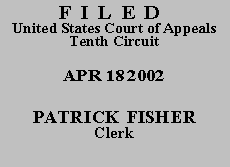

| UNITED STATES OF AMERICA,
Plaintiff - Appellee, v. JOHNNY JOE CROWLEY, Defendant - Appellant. |
CR-99-441-JP)
|
Defendant seeks a certificate of appealability (COA) under 28 U.S.C. § 2253(c)(1)(B), to appeal the district court's denial of his action pursuant to 28 U.S.C. § 2255 seeking a reduction of his sentence by twenty-four months to reflect credit for presentence confinement. To obtain a COA, defendant must make "a substantial showing of the denial of a constitutional right." 28 U.S.C. § 2253(c)(2). We deny a certificate of appealability and dismiss the appeal.
Defendant contends he was denied effective assistance of counsel because his attorney failed to assert defendant's entitlement to an adjusted concurrent sentence under U.S.S.G. § 5G1.3(b). He also contends the district court erred in failing to appoint counsel to represent him on his § 2255 motion.
U.S.S.G. § 5G1.3 provides:
(a) If the instant offense was committed while the defendant was serving a term of imprisonment (including work release, furlough, or escape status) or after sentencing for, but before commencing service of, such term of imprisonment, the sentence for the instant offense shall be imposed to run consecutively to the undischarged term of imprisonment.
(b) If subsection (a) does not apply, and the undischarged term of imprisonment resulted from offense(s) that have been fully taken into account in the determination of the offense level for the instant offense, the sentence for the instant offense shall be imposed to run concurrently to the undischarged term of imprisonment.
(c) (Policy Statement) In any other case, the sentence for the instant offense may be imposed to run concurrently, partially concurrently, or consecutively to the prior undischarged term of imprisonment to achieve a reasonable punishment for the instant offense.
The presentence report clearly stated that defendant's sentence was governed by U.S.S.G. § 5G1.3(c). R. Supp. Vol. I, at 12.(1) The report also reflected that the only offense taken fully into account in determining the offense level was the 1994 offense behavior, not the unserved 1999 terms. Id. at 3. The plea agreement further stated that although the parties believed defendant should receive credit for time served from the date of his arrest on September 8, 1998, they acknowledged that the Bureau of Prisons would ultimately make that calculation. R. Doc. 1, Plea Agreement at 5.
The district court exercised its discretion under § 5G1.3(c) to order that the federal sentence run concurrently with the undischarged state sentence from the 1999 convictions, but explained to (as acknowledged by) the defendant that the final determination of credit rested with the Bureau of Prisons. R. Doc. 9, Sentencing Hr'g Tr. at 8-11. See United States v. Jenkins, 38 F.3d 1143, 1144 (10th Cir. 1994) (under United States v. Wilson, 503 U.S. 329 (1992), sentencing court may not award sentencing credit for time served). Because defendant's sentence was not governed by § 5G1.3(b), counsel was not ineffective for failing to argue a claim of entitlement to sentence credit.
Nor was defendant entitled to counsel to pursue his § 2255 motion. See Pennsylvania v. Finley, 481 U.S. 551, 555 (1987) (no right to appointed counsel to pursue collateral attack on conviction). Only when an evidentiary hearing is required is a defendant entitled to counsel. Swazo v. Wyo. Dep't of Corr. State Penitentiary Warden, 23 F.3d 332, 333 (10th Cir. 1994).
Defendant has failed to make a substantial showing of the denial of a constitutional right. See 28 U.S.C. § 2253(c)(2). We DENY a COA and DISMISS the appeal.
Entered for the Court
Circuit Judge
*. This order and judgment is not binding precedent, except under the doctrines of law of the case, res judicata, and collateral estoppel. The court generally disfavors the citation of orders and judgments; nevertheless, an order and judgment may be cited under the terms and conditions of 10th Cir. R. 36.3.
1. United States Sentencing Guideline § 5G1.3(c) provides for optional concurrent sentencing if neither § 5G1.3(a) or (b) applies.